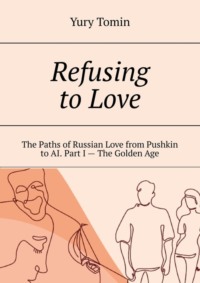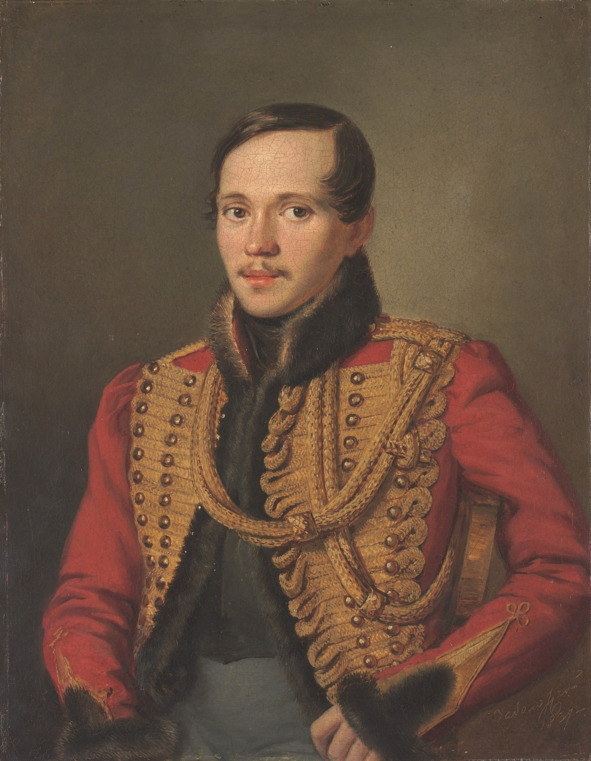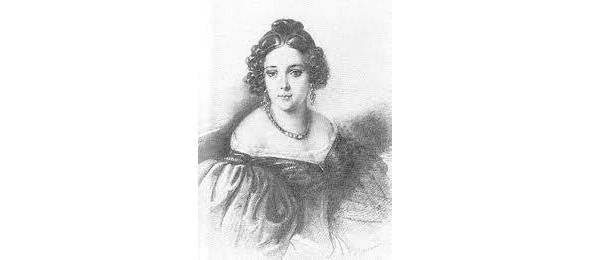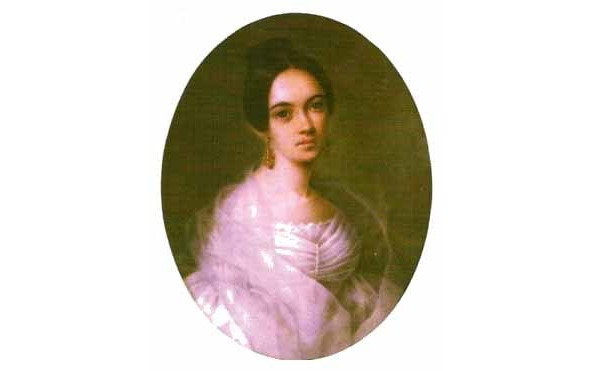
Refusing to Love. The Paths of Russian Love from Pushkin to AI. Part I – The Golden Age
In his diary entries Pushkin follows with interest the development of the scandal surrounding the marriage of Bezobrazov and, perhaps anxiously, tries some of the circumstances on himself. The wedding of the handsome aide-de-camp with the maid of honor Lyubov Khilkova was sponsored by the imperial couple. Soon, however, it became known that the maid of honor was having an affair with the sovereign, that her husband was terribly jealous, beating her, and… a dagger flashed. The story was loud and instructive. For example, P. A. Vyazemsky wrote to their mutual friend with Pushkin: «Here we all complained about the flat prose of our everyday life, but, on the contrary: romantic poetry is made in person and such that it will shut up Hugo and Dumas. Jealousy, the dagger, criminal love, all this is now the currency of our drawing-room conversation, and all the familiar faces and circumstances of yesterday. Who could have imagined that poor Lyuba Khilkova, the cold, sensible, measured, perfect, exemplary piece of ice of the Winter Palace, would be the heroine of such a tragic tale! So much for the marriage of love! Now none of the girls would dare to marry for love.» He was exiled to the Caucasus, she went to her brother in Moscow and four months after the wedding she had a miscarriage.
In 1837 Mikhail Lermontov, who became famous for his defiant poem on Pushkin’s death, was exiled to the Nizhny Novgorod Dragoon Regiment commanded by Bezobrazov. And four years later Bezobrazov would come to Lermontov’s funeral and carry his coffin.
VI
The relay of Romanticism. Love-passion. The two ways of romantic love. Love-aspiration. The kidnappers of love. Faithful dreams. Flattery instead of love. Passing the baton
Young Lermontov delved into Pushkin’s «wonderful songs», rewrote poems, and shared with Pushkin his knowledge of people. At the same time, Lermontov was distinguished by close attention to his own mental states, the depth of which he discovered in a combination of feelings of love and awareness of his sharp mind and poetic talent. All the turbulent events of his youth turned into a struggle of internal forces in such a way that he found «the root of torment in himself.» For Lermontov, love is the strongest passion, the focus of his heartfelt impulses as an expression of the true «I»:
Many lovers do not trust the worldAnd so are happy; others feel desireEngendered in their blood and outwards swirledIn brain disorder or creative fire.Love, of all the passions, most divine;Yet, a thing I never could define!Seems a love can take but one sure course:At fever pitch with all my psychic force!And in the proud soul of the romantic hero, vain rejected love will undoubtedly «revolt, breathing revenge»:
From now on I will enjoyAnd in passion I will swear as a boy;I will laugh with everyoneAnd I don’t want to cry with anyone;I shall deceive without misgivings,To find no love as I once made, —How can I respect other womenWhen I, by Angel, been betrayed?Yu. Lotman, analyzing the work of Lermontov, points to two ways of love of the romantic hero. Firstly, the romantic scheme of love contains “the impossibility of contact: love always appears as deceit, misunderstanding, betrayal.” Secondly, “the impossibility of breaking through the line of incomprehension in love created, next to tragic real love, an ideal love-aspiration, in which the object could in no way be endowed with the features of an independent personality: it was not another ‘I’, but an addition to mine ‘I’ – ‘anti-I’… my ideal otherness… This is not a person, but the direction of my movement”.
My love for you is not an ardent thing,And I can take or leave your beauty’s lustre:In you I love past suffering’s memories’ muster,The misspent youth to which I’d like to cling.And when, betimes, I look upon your face,On delving eyes in my preoccupation:I’m having then a secret conversation,For you are not my words of passion’s chase.I’m talking to a love of younger days,And in your face I’m other’s features seeking,The lips of one who’s long since finished speaking,In eyes extinguished flame of other’s gaze.If one carefully read this poem, written in the fateful 1841 ten years after the passionate love for N. F. Ivanova, then, according to Lotman, it expresses (through love, but not real love; through love, but for another; through love not for her, but for something in the object of love; for something connected with the lover himself) the poet’s love-aspiration for his ideal “I”.

Mikhail Yuryevich Lermontov (1814—1841)
After “happiness soon changed” with Ivanova, one can trace the transformation of Lermontov’s passionate love into “love-aspiration”, starting with attraction to Varvara Lopukhina, expressed in a poem written in 1832:
Not with the proud kind of beautyShe charms the animated youth,And she doesn’t drag behind her booty —The crowd of her slaves, confused.Her waist isn’t one of any goddess,Her breast does not rise like sea waves,And nobody calls her gorgeous,While falling on his knees on earth.But every movement, every action,Her features, speeches, smiles – all theseSo full of life and inspiration,So full of otherworldly ease.Her voice pervades the whole soul,Like memory of happy days,And heart is sunk in love and dole,While being shameful of its zest.
Natalya Feodorovna Ivanova (1813-1875)
Biographers know that, carried away not by the bright beauty, but by some “original charm” of the seventeen-year-old Varen’ka Lopukhina, student Mikhail Lermontov felt the sincere sharing of his love. It is also known that the relatives of Lopukhina prevented the rapprochement of the lovers, and then three years later, His Majesty the ball, which became an invisible companion of any noticeable love in high society, entered into the matter of chance. A certain Bakhmetiev, retired major, a 37-year-old landlord, who thought of marriage, saw “an undoubted indication from above” that “Varenka Lopukhina hooked her ball scarf on the button of his coat.”
This love has remained with Lermontov forever – «faithful dreams» have preserved that image, «that look full of fire,» and, regretting the bitter fate of his beloved, he prayed for the salvation of her «beautiful soul»:
…I want to hand over the innocent maidenTo the warm intercessor of the cold world.Surround her with happiness as she worthy of bliss,Give her companions full of care,Give her youth and old age peace —To the innocent heart world of prayer.
Varvara Alexandrovna Lopukhina-Bakhmeteva (1815—1851)
Now his own soul was not filled with vengeance, but sorrow. However, this saved love did not pacify, but rather exacerbated the peculiar struggle of the poet romantic with high society, where love is relegated to coquetry, passion for external beauty and fashionable intrigue.3 With the help of his exceptional talent, as well as his “vanity and pride,” Lermontov managed to achieve, if not a sincere love, then a flattering recognition of high society.
There was a time when I aspired to be admitted to this society as a recruit. I did not succeed; the aristocratic doors were closed to me. And now I no longer enter this same society as a petitioner, but as a man who has won his rights. I arouse curiosity, they harass me, they invite me everywhere, but I don’t even show that I want this…
Not only did he “insult all this world” in his poems before, but now he made sure from the inside that “nowhere is there so much meanness and ridiculousness.” However, the great world and, above all, the crowned one paid him in the same way. It is not known what the retired major Bakhmetyev thought of Lermontov’s death in the duel, but Nicholas First muttered in a mundane way: “Death to a dog”, but in public he said: “Gentlemen, I have received news that the one who could replace Pushkin has been killed.” Six years later, there was another duel where Sofia Bakhmetyeva’s brother was killed, trying to defend the honor of his well-educated, but untimely pregnant sister.
VII
Mask, I love you. Achilles’ heel. The saving hope. Precious needs of the heart. We are a single link in an infinite chain. Overcoming doubt. The transformation of love. About the rebirth of Don Juan. Poets and philosophers. Illusions of the romantic ideal. The first dimension of Russian love
Ten years after Lermontov’s death, a well-read woman who knows fourteen foreign languages, femininely charming and independent in her way of life, a distant relative of the kidnapper of Lermontov’s love, enters the society of Russian literati and the final scene of romantic love for the first time. And again there was not without a ball, this time a masquerade ball. Sophia Bakhmetyeva, hiding her face with a mask, managed to enchant two outstanding people, not alien to poetic inspiration, with a conversation at once. During the following meeting and chat over tea, one of them – Ivan Turgenev – was disappointed to see “the face of a Chukhonian soldier in a skirt,” while the other – Alexey Tolstoy – was carried away and fell passionately in love.
It would be simplistic to suppose that Alexey Konstantinovich Tolstoy – a thirty-four-year-old handsome man, naturally strong, gifted with an exceptional memory, torn between writing and court service and a friend of the imperial family – had merely overcome the difficulty, already noted by Lermontov’s Pechorin, of “falling in love only with a quality of soul”. In the poem dedicated to this fateful encounter, other motifs covered by mystery can also be discerned:
Конец ознакомительного фрагмента.
Текст предоставлен ООО «ЛитРес».
Прочитайте эту книгу целиком, купив полную легальную версию на ЛитРес.
Безопасно оплатить книгу можно банковской картой Visa, MasterCard, Maestro, со счета мобильного телефона, с платежного терминала, в салоне МТС или Связной, через PayPal, WebMoney, Яндекс.Деньги, QIWI Кошелек, бонусными картами или другим удобным Вам способом.
Примечания
1
V. Sollogub, who knew Pushkin, in his memoirs about Natalya Nikolaevna, wrote that «I have never seen a woman who combined such a completeness of classically correct features and stature. High in stature, with fabulously thin waist, with richly developed shoulders and chest, her little head like a lily on a stem, swaying and gracefully turned on a thin neck, such a beautiful and regular profile I have never seen more, and skin, eyes, teeth, ears! Yes, it was a real beauty, and not without reason, all the rest, even among the most beautiful women pale somehow at her appearance.»
2
Could Nicholas the First have foreseen thus he would resolve the anguish of the heart, settle down the "cleverest man of Russia", and he himself would be carried away by Pushkin's future wife?
3
The romantic hero sooner or later discovers that there are techniques for controlling love’s passion. This skill, honed to perfection of art, “incidentally touching some of the strings of the human heart” allows one to inspire love or a woman’s caprice, but does not allow one to forget the fakeness of the inspired feeling if the natural foundations of love are missing. One of these is the possession of traits of natural beauty, unmistakably defined by “aristocratic feeling.”
Вы ознакомились с фрагментом книги.
Для бесплатного чтения открыта только часть текста.
Приобретайте полный текст книги у нашего партнера:
Полная версия книги
